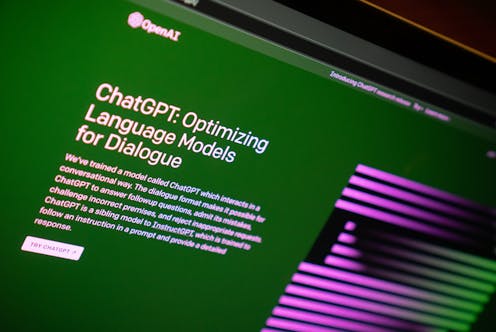The rise of ChatGPT shows why we need a clearer approach to technology in schools
- Written by Leslie Loble, Industry Professor & Paul Ramsay Foundation Fellow, University of Technology Sydney

ChatGPT and its powerful capacity[1] to generate original text has taken the education sector by surprise. Not only are universities hurrying to adapt to it, schools are also grappling with this new technology.
NSW and most other states blocked the tool[2] in public schools, to protect students from possible misinformation and curb cheating. But South Australia[3] has allowed use of ChatGPT, in part so students can better learn and understand the potential and risks of artificial intelligence.
The range of responses to ChatGPT shows how education has yet to figure out the best way to use such tools.
ChatGPT is also just the latest example of technology coming into classrooms. Education technology (or “edtech[4])” is a common – and rapidly growing – part of day-to-day learning. But we need to understand it better.
Edtech in Australian schools
The global edtech market[5] is estimated to be worth about US$300 billion (A$432 billion). More than one billion students globally are expected to use edtech by 2025. Google[6] and Microsoft[7] are major players, but investment is also increasingly fueled[8] by China, India and the European Union.
Edtech includes teaching support platforms, with sample lesson plans, tasks, games and tests. It also includes AI-backed personalised learning tools to help with maths, literacy and other school subjects. As of 2019, Australian teachers were using an estimated 250 different types[9] of edtech, although there is no reliable number of how many use AI.
Read more: The ChatGPT chatbot is blowing people away with its writing skills. An expert explains why it's so impressive[10]
We already know some of these edtech tools are having positive results[11], including in disadvantaged areas[12]. Studies suggest adaptive tutoring, which adjusts to the precise needs and level of the individual student, is especially promising[13].
Edtech also allows for more personalised assessment. As students move through a lesson answering questions, they can automatically get feedback, find additional instruction and branch into easier or harder content as needs be. Most importantly, teachers get detailed insight to student progress that allows them to adjust their teaching to better match what students need.
But despite these advancements, we also know edtech delivers the best results[14] when the tools are based on proven teaching techniques. Poorly designed tools also can undermine education. In the United States, national funding laws[15] now push school districts to make sure edtech and other teaching tools are independently evaluated for positive impact.
There are significant risks to these tools as well, especially around privacy[16] and the marketing of student and teacher data collected when they use the tech. These risks increase if autonomous AI is behind the tool.
How can we prepare for more edtech in schools?
With a rapidly expanding edtech market, it’s easy for teachers and parents to be confused about what’s on offer, how to use it and whether it will help students learn.
ChatGPT highlights quickly products are emerging and how quickly education systems will need to respond. We need governments to be shaping what and how technology is used in classrooms to ensure high quality, safe products and avoid being caught by surprise.
Globally, some steps are underway. The EU has adopted a comprehensive digital education plan, the US has created a dedicated national edtech office, and the United Kingdom[17] and Singapore[18] want to use edtech to tackle specific learning needs.
Read more: As more biometric data is collected in schools, parents need to ask these 10 questions[19]
What Australia needs to do
Australia also needs to ramp up government leadership in managing the opportunities and risks that come with this edtech. This includes:
quality requirements for the tech itself – including evidence it is based on education research
professional learning and support for schools and teachers using it
regulation and transparency around how student data will be collected, stored and used.
Independent websites in the US are also helping schools and families find high-quality learning resources (including digital tools). For example, EdReports[20] assists teachers to evaluate curriculum materials, while Evidence for ESSA[21] reviews the quality of research behind claimed edtech impact.
What next
A growing body of research shows that high-quality education technology can be a powerful tool to improve student outcomes, particularly for students facing education disadvantage.
But not all edtech tools work well and much depends on how schools use them.
The most important impact of ChatGPT may be to galvanise governments and education systems to ensure Australian schooling can proactively and properly use edtech in our classrooms.
The next National School Reform Agreement offers the perfect opportunity to do this. This agreement ties federal, state, and territory funding mechanisms to lifting student learning outcomes. It is currently being negotiated and is due in December 2024.
It is important we use the opportunities provided by edtech, rather than edtech using us.
Read more: Why is tech giant Apple trying to teach our teachers?[22]
References
- ^ powerful capacity (theconversation.com)
- ^ blocked the tool (www.smh.com.au)
- ^ South Australia (www.abc.net.au)
- ^ edtech (www.pwc.com.au)
- ^ edtech market (www.holoniq.com)
- ^ Google (blog.google)
- ^ Microsoft (www.microsoft.com)
- ^ increasingly fueled (www.holoniq.com)
- ^ 250 different types (ofai.edu.au)
- ^ The ChatGPT chatbot is blowing people away with its writing skills. An expert explains why it's so impressive (theconversation.com)
- ^ positive results (journals.sagepub.com)
- ^ disadvantaged areas (www.uts.edu.au)
- ^ especially promising (www.nber.org)
- ^ delivers the best results (www.educationperfect.com)
- ^ national funding laws (www.ed.gov)
- ^ privacy (theconversation.com)
- ^ United Kingdom (www.nesta.org.uk)
- ^ Singapore (www.moe.gov.sg)
- ^ As more biometric data is collected in schools, parents need to ask these 10 questions (theconversation.com)
- ^ EdReports (www.edreports.org)
- ^ Evidence for ESSA (www.evidenceforessa.org)
- ^ Why is tech giant Apple trying to teach our teachers? (theconversation.com)

















